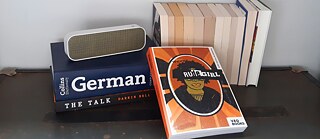July 2024
Birgit Weyhe’s 'Rude Girl': breaking new ground in graphic novels

Adding to the canon of graphic novel memoirs, Birgit Weyhe’s Rude Girl uses similar techniques to Darrin Bell’s The Talk in challenging privilege and institutional racism – an engaging and eye-opening biography translated by the subject herself.
In 2018, the German comic artist Birgit Weyhe received an interview request from the African American academic Priscilla Layne. A professor of German Studies, Layne was in Berlin on a research fellowship and intended to interview Weyhe about the portrayal of Black lives in her work (which includes the graphic novel Madgermanes, also published in translation by V&Q Books). What emerged was a long and much deeper collaboration, with Weyhe creating first a newspaper comic strip and then the graphic novel Rude Girl based on Layne’s life and experiences. Now, adding an extra link to the chain, this visually striking, challenging and important novel has been translated into English by Priscilla Layne herself.
Rude Girl is a fictionalised account of how Layne – who appears in the novel as Crystal – grew up in Chicago facing poverty, sexual abuse, anxiety, racism and discrimination; how she found refuge in music, sport and subcultures, becoming a softball player and skinhead, then pursued an interest in German that took her to Berlin; and finally how she established a career as a translator, critic and professor in both German and African Diaspora Studies. Weyhe relates her story in a series of powerful six-frame pages, employing a muted colour palette of black, white, beige and orange across her lively, people-led illustrations that make this novel a compelling read from first strip to last.
Rude Girl is not merely a biography, however: it engages actively and thoughtfully with systemic racism, class, gender, identity, white privilege and the representation of People of Colour in literature. In its constant questioning of itself – pale-orange sections between chapters depict Layne offering Weyhe critical feedback on her illustrations and adding context to the events narrated therein – this novel is just as much about its creator as its subject, interrogating cultural appropriation and storytelling as an art. In so doing, it requires readers to challenge themselves, too, to reconsider their own privilege and ask what biases – unconscious or otherwise – they bring to their reading of this story and, crucially, the world. Above all, Rude Girl is a novel about learning, told in a uniquely probing and eye-opening format.
Fans of graphic novels will no doubt be familiar with the work of Pulitzer Prize-winner Darrin Bell, whose memoir ##The Talk offers an illuminating and moving portrayal of life as a young Black man in Los Angeles. Published in 2023, it turns the spotlight on racism in America up to and beyond the murder of George Floyd in 2020, using techniques also employed by Weyhe to challenge society directly. Much like Rude Girl, The Talk is visually striking, with traumatic experiences conveyed through scribbles, smudges and heavy application of colour; both novels also weave in different artistic media, with Rude Girl leaning on Crystal’s love of music while The Talk works extensively with references to film.
Taking a genre all too often consigned to a niche in the bookshop, Weyhe, like Bell, displays the emotional and intellectual power of the graphic novel. Rude Girl is a ground-breaking work of biography, art and translation that exposes society’s worst failings and highlights how much we still need to do. As the author concludes, ‘we are increasingly heading towards a polarization of opinions around the world’, yet by talking to and learning from one another – and, vitally, allowing for mistakes – we can change our own and others’ perspectives. In creating this unique work of art, Birgit Weyhe and Priscilla Layne have laid bare the challenges, but have also gone a long way towards proving what is possible.
You will find further information about the book/s and how to borrow them below under Related Links.
ABOUT THE AUTHOR
